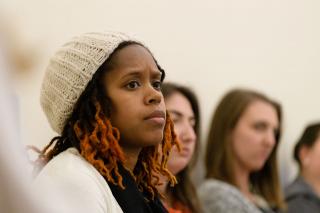This semester, Simmons University welcomes twelve Master’s in Social Work students into the Survivor Link + Public Health Americorps program. This program, a collaboration with Arizona State University and funded by AmeriCorp and the Centers for Disease Control and Prevention, teaches MSW students about intimate partner violence (IPV) and prepares them to share this training with colleagues at their practicum sites. The selected students receive $4,000 stipends throughout the program, and are eligible for a contribution ($2,500) toward loan repayment upon completion.
Last year, Simmons selected six students; this year, the University received additional funding for twelve students. Survivor Link is a nationwide program that has provided training to professionals at over 101 public health and complementary agencies across 11 states. The goal is to offer the tools providers need to support domestic violence survivors in their communities.
“The pilot program went so well that we’re doing it again and expanding it to include our online MSW students,” says Professor and PhD Program Director Kristie Thomas. Students then share their knowledge via a series of formal trainings at their practicum site, thus expanding the reach of the program. This model disseminates the training, not just to other social workers, but to health providers and human service professionals. For example, several of the sites are substance use treatment centers. “Students learn how to sensitively and effectively serve the needs of vulnerable clients at the intersection of substance use, domestic violence, and homelessness. They then train their coworkers to do the same.”
Dr. Thomas works closely with Associate Professor of Practice and Director of MSW Practicum Education Eugenia Knight to select and support students throughout their time in the program. “Any opportunity to increase student skills can be transformative,” says Knight. “Through this program, students also contribute to increasing the capacity of their agencies to engage in this critical work and to better serve those experiencing IPV.”
Survivor Link training sessions are offered via Zoom and can be watched live or as recordings. Topics include working with IPV among gender and sexual minorities, older adults, Indigenous women, in Black and Latina communities, among military populations and veterans, refugees and immigrants, and on college campuses. Other sessions address overlapping concerns of mental health, substance use, and homelessness and housing instability, and child welfare. In addition to learning how to support survivors, trainees are taught safety planning, advocacy, and the basics of trauma-informed care.
Akossiwa Chimene Agogo ’23MSW, a Case Manager at FamilyAid Boston, a community-based homeless shelter, says that the training prepared her to work with clients who have suffered domestic violence. “The experience provided me with an understanding of the proper way to talk to clients who had experienced domestic violence,” says Agogo. “I am able to put myself in their shoes. I know that their behavior is coming from their own experiences and is not related to me.”
Mikayla Bates ’22MSW recalls having limited knowledge of what DV and IPV were, prior to the training. “I didn't know the 'warning' signs to look for, how DV/IPV is present and appears in different marginalized communities, how to best help victims and survivors, and what resources to connect them to in the local area,” says Bates. “Through the training, I was able to expand my knowledge in these topic areas as well as provide training to my co-workers at my internship site so we could better help our clients at the shelter.”
The training has given Bates a confidence boost, especially in assisting clients. “I know how to assess them and engage with them through a harm reduction lens that prioritizes their safety.”
Agogo reports reaping other benefits from the program. “It pushed me out of my comfort zone,” she says, referencing the presentation she gave to her colleagues. “I’m usually one on one with a client, not speaking publicly. But [when training colleagues] there were 25-35 people in the room!”
Knight sees this as a unique element of the program. “Witnessing students become more confident as they translate their learning into training others and thoughtfully collaborating with one another was a highlight,” she says. “And serving as a faculty advisor with my incredible colleague, Dr. Thomas, who also happens to be a recognized scholar in the field and an IPV expert, was truly remarkable.” Students are also welcomed into a supportive community of social workers. “We host meetings throughout the year, so students feel supported and connected to one another,” says Thomas. “The group last year really bonded.” Bates values the relationships she was able to build, locally and nationally, with like-minded peers. “I was able to forge lifelong connections with these individuals through which we can enhance our professional knowledge and, hence, the care we provide to our clients, by leaning on each other for support and advice.” Bates praised the supervising staff who ensured the students “had the space to be curious and feel a sense of community.”
Agogo says, “This program allows you the space to use your own experience and apply it to make a difference in other people’s lives. It’s an opportunity for growth, especially if you want to work [with this community] in the future. It offers a great education, and the chance to educate others, as well.”

